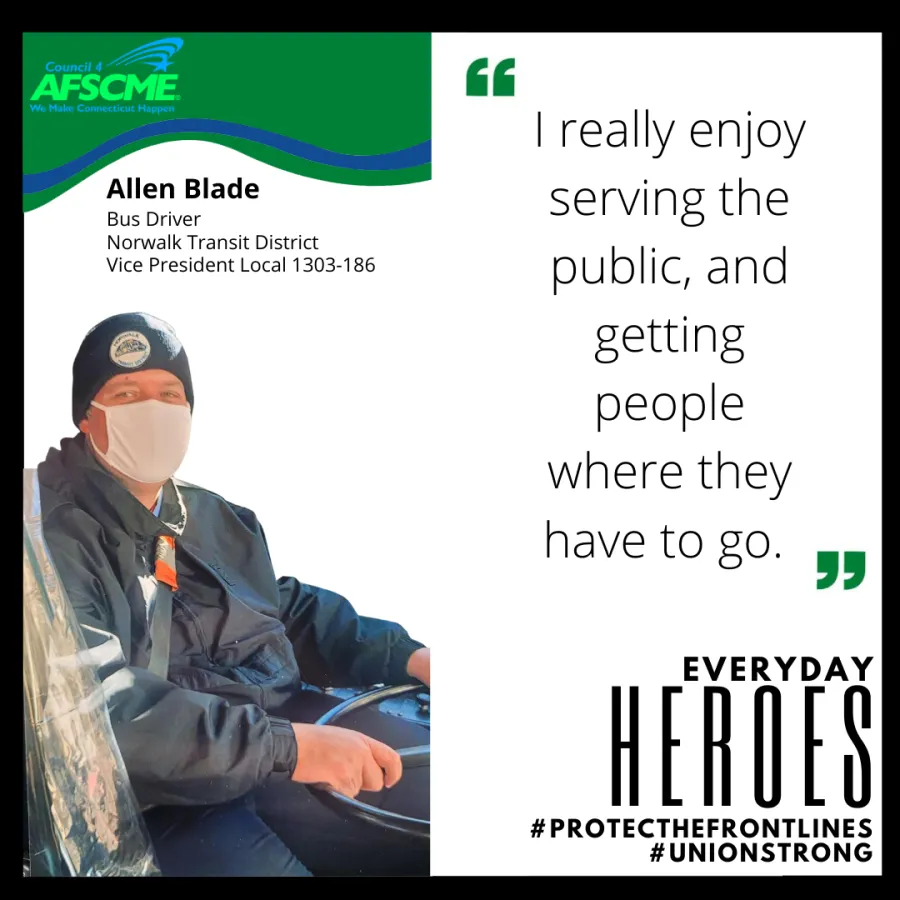AFSCME Member Champions Public Transit While Driving Through COVID

As a veteran bus driver for Norwalk Transit, Allen Blade knows a thing or two about navigating through crises and going above and beyond the call.
“I really enjoy serving the public, and getting people where they have to go. You meet all kinds of people in this business,” he shared. “You’re more than a bus driver, sometimes. We can be counselors and psychologists.”
Blade is the Vice President of AFSCME Local 1303-186, which represents nearly 100 drivers, mechanics and and cleaners employed by Norwalk Transit. Like every other sector, public transit employees continue to be impacted personally and professionally by COVID-19.
A 20-year driver at Norwalk Transit, Blade tested positive for the coronavirus last November and missed a month at work. “I went through a lot,” he said, “and fortunately I made it through the fight. But it’s scary.”
Nine other of Blade’s co-workers have tested positive since the onset of the pandemic last March. Some have gotten it through public interaction, others while doing their cleaning duties. One union member was on a ventilator and in a medically induced coma for 2 months.
Local 1303-186 members are risk managers with public-facing jobs. The pandemic continues to create uncertainty and even fear, but has not stopped union members from making sure their passengers get to where they are going safely, and on time.
“Buses are out in the public,” Blade explained. “You don’t know who has COVID and who doesn’t. We’re in constant contact with customers. This is something you don’t want to catch.”
Norwalk Transit union members have also assumed the informal role of educators, advocates and in some cases policy enforcers. Drivers like Blade are authorized to keep bus doors closed until riders cover their faces with a mask. Once on the bus, however, riders are not mandated to keep their mask on.
Blade is not afraid to ask people to put on a mask, but he approaches the task from a standpoint of diplomacy and tact: “I try to talk to people and get them to undertand that we need to protect ourselves. All of us.”
There are other periodic threats, too, like the time a passenger attempting to ride for free pulled out a small knife when Blade asked him to pay his fare. Blade kept calm, and stared him down.
Working in public transit has afforded Blade an appreciation for the role his union can play in advocating not only for decent pay and benefits, but safer working conditions.
“The union helps with communicating to management. Sometimes they don’t want to listen, but the unions helps us speak up for ourselves,” he said.
Blade has been a union officer for two years. “I still have a lot of learn, but I just want to look out for the members,” he offered. “I’m a good listener and try to figure things out and help my co-workers.”
Local 1303-186 members also understand the historic importance of public transportation.
That’s why Blade took a moment to reflect on National Transit Equity Day, an annual day of action that takes place Feb. 4 – the birthday of Rosa Parks. Her act of resistance by refusing to give up her seat on a Montgomery, AL, bus in 1955 was a catalyst for the civil rights movement. It affirmed that everyone has the right to equal access to public transit.
“Rosa Parks was a civil rights activist who felt no matter what the color of your skin, you shouldn’t be told where to sit on a bus. She felt that we could be stronger, united as one, than separated as all,” Blade reflected.
(In our state, the Connecticut Roundtable on Climate and Jobs has taken the initiative to raise public awareness and build public support around transit equity and and renewable energy as part of its broader mission. Council 4 is an affiliate of the Roundtable.)
Blade appreciates this moment when labor, environmental and civil rights concerns are so deeply connected. He said it’s important “to recognize what pollution is doing to the earth. As a transit driver, I believe we should drive cars less and use public transportation with less pollution, such as battery powered and biodiesel buses.”
